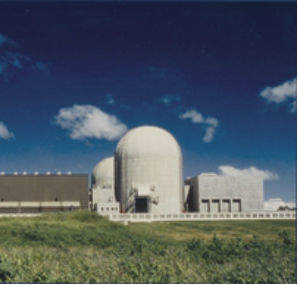An European Union peer review has concluded that the safety standards applied in Taiwanese nuclear power plants are "generally high and comply with international state-of-the-art practices." However, the peer review team has strongly recommended further improvements in view of Taiwan's vulnerability to natural hazards.

An European Union peer review has concluded that the safety standards applied in Taiwanese nuclear power plants are "generally high and comply with international state-of-the-art practices." However, the peer review team has strongly recommended further improvements in view of Taiwan’s vulnerability to natural hazards.
Taiwan currently has six reactors in operation: twin boiling water reactors at both the Chinshan and Kuosheng nuclear power plants, and two 950 MW pressurized water reactors at Maanshan. Two advanced boiling water reactors are also under construction at Lungmen near Taipei.
All nuclear power plants in the EU underwent stress tests and peer reviews in 2011 and 2012. Many other countries and territories also conducted comprehensive nuclear risk and safety assessments, based on the EU stress-test model.
In April 2013, the Taiwanese nuclear safety regulator, the Atomic Energy Council (AEC), invited the European Commission to set up an independent peer review of the stress tests of the Taiwanese NPPs, which were conducted in 2012 by the licensee, the Taiwan Power Company, and by AEC. The European Commission and the European Nuclear Safety Regulators’ Group (ENSREG) began the peer review at the end of May 2013. The results were released by the EC on 7 November (summary report).
The EU peer review noted that AEC has not identified any safety-related weaknesses in Taiwanese NPPs, which would require their immediate shutdown. Nevertheless the team recommended "tangible further improvements" in some specific safety related areas.
The peer review recommendations call for action to make the power plants more robust against the effects of large earthquakes and flooding, e.g. by building higher tsunami protection walls. It also said "more up-to-date methods and data should be used to evaluate seismic and flooding risks."
The report praised that AEC has ordered the installation of a filtered containment venting systems at all units (it was only installed at one NPP prior to Fukushima). It also said that the ordered installation of passive autocatalytic hydrogen recombiners would "significantly improve the capability of the operators to avoid critical hydrogen build up in the containment and thus reduce risk of explosions." However it did point out that further evaluations are considered necessary to check whether these systems are of sufficient capacity to cope with beyond design basis accident scenarios.
In terms of severe accident countermeasures, the peer review team recommended that given the close proximity of some NPPs, multi-unit and multi-site effects, should be assessed in order to identify potential cliff edge effects. The peer review team also recommended the development of strategies to minimise the quantities of contaminated water produced under accident conditions and the evaluation of options to create closed cooling circuits could greatly improve plant preparedness.
The report advised three measures that could help to ensure transparency on the status of nuclear safety in Taiwan. It also recommended further international cooperation with Taiwan on nuclear safety.
"Despite the fact that nuclear safety is a global issue, Taiwan currently remains, however, somewhat isolated from the international debate on it and would need to attain greater involvement," the report concludes.
It encouraged the international community to consider "more effective ways of cooperation with both the Taiwanese regulator and the licensee," particularly on issues where their integration in international efforts has the potential to significantly reduce risks to human health and the environment on regional and global scales.
The European Commission is currently holding discussions with Armenia and Turkey, regarding possible peer review of their stress tests.
Photo: Maanshan nuclear plant, Taiwan
